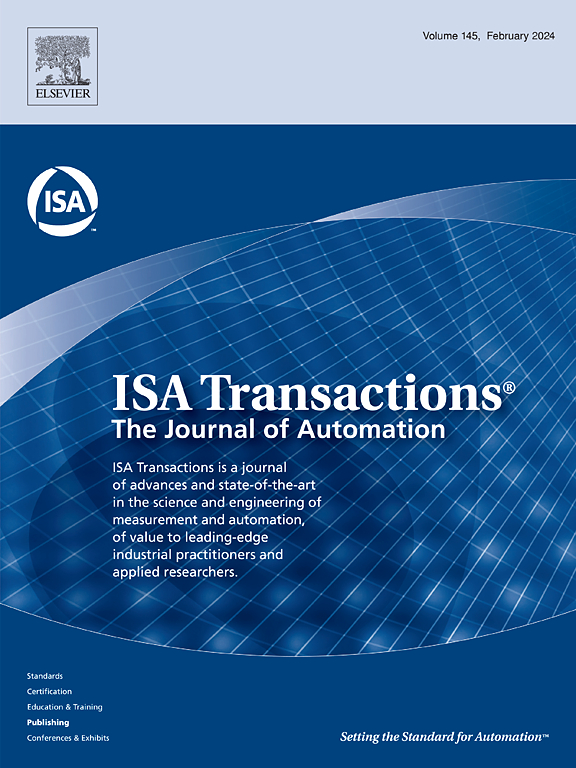A nonsingular fast terminal sliding mode control scheme for robust trajectory tracking of the underactuated EvoBot modular mobile robot in the vertical plane
IF 6.5
2区 计算机科学
Q1 AUTOMATION & CONTROL SYSTEMS
引用次数: 0
Abstract
A robust control strategy for the vertical plane motion of an underactuated EvoBot mobile robot, modeled as a serial double inverted pendulum, is presented in this study. The control objectives include controlling both the directly actuated generalized coordinates and the non-actuated generalized coordinate, which is controllable through dynamic coupling with the actuated coordinates. In this regard, the system's dynamic equations are derived using the Lagrangian approach. A new nonlinear and nonsingular sliding manifold is introduced, based on which a nonsingular fast terminal sliding mode control scheme is proposed for the trajectory tracking control of the robot. This approach addresses the challenges posed by underactuation, system nonlinearities, instability, parameter uncertainties, and external disturbances. Through Lyapunov stability analysis, it is proven that finite-time asymptotic convergence of the tracking error to zero is ensured when the uncertainty upper bound is known, and convergence to a residual set is achieved when the upper bound is unavailable. The theoretical guarantees provided by the proposed control scheme are further validated through comprehensive MATLAB simulations, where its effectiveness is demonstrated under both low- and high-frequency disturbances as well as parameter uncertainties.
欠驱动EvoBot模块化移动机器人垂直平面鲁棒轨迹跟踪的非奇异快速终端滑模控制方案。
针对欠驱动的EvoBot移动机器人的垂直平面运动,提出了一种鲁棒控制策略,并将其建模为串联双倒立摆。控制目标包括控制直接驱动广义坐标和非驱动广义坐标,非驱动广义坐标通过与驱动坐标的动态耦合实现可控。在此基础上,利用拉格朗日方法推导了系统的动力学方程。引入了一种新的非线性非奇异滑动流形,在此基础上提出了一种用于机器人轨迹跟踪控制的非奇异快速终端滑模控制方案。这种方法解决了驱动不足、系统非线性、不稳定性、参数不确定性和外部干扰带来的挑战。通过Lyapunov稳定性分析,证明了当不确定性上界已知时,跟踪误差有限时间渐近收敛到零,当不确定性上界不可用时,跟踪误差收敛到残差集。通过全面的MATLAB仿真进一步验证了所提控制方案提供的理论保证,在低频和高频干扰以及参数不确定性下证明了其有效性。
本文章由计算机程序翻译,如有差异,请以英文原文为准。
求助全文
约1分钟内获得全文
求助全文
来源期刊

ISA transactions
工程技术-工程:综合
CiteScore
11.70
自引率
12.30%
发文量
824
审稿时长
4.4 months
期刊介绍:
ISA Transactions serves as a platform for showcasing advancements in measurement and automation, catering to both industrial practitioners and applied researchers. It covers a wide array of topics within measurement, including sensors, signal processing, data analysis, and fault detection, supported by techniques such as artificial intelligence and communication systems. Automation topics encompass control strategies, modelling, system reliability, and maintenance, alongside optimization and human-machine interaction. The journal targets research and development professionals in control systems, process instrumentation, and automation from academia and industry.
 求助内容:
求助内容: 应助结果提醒方式:
应助结果提醒方式:


